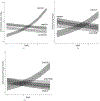Associations between self-monitoring and weight change in behavioral weight loss interventions
- PMID: 31556659
- PMCID: PMC6861632
- DOI: 10.1037/hea0000800
Associations between self-monitoring and weight change in behavioral weight loss interventions
Abstract
Objective: The current study is a secondary analysis of the Live SMART trial, a randomized controlled trial comparing a behavioral weight loss (BWL) condition delivered via smartphone (SMART) to a group-based BWL condition (GROUP) and a control condition (CONTROL). Given the established importance of self-monitoring for weight loss, the aims were to evaluate bidirectional associations between adherence to self-monitoring and weight change and to examine the moderating effect of treatment condition on these associations.
Method: Adults with overweight/obesity (n = 276; 83% women; 92.8% White; Mage = 55.1 years; Mbody mass index = 35.2 kg/m2) were instructed to self-monitor dietary intake, daily weight, and physical activity minutes via paper diaries in GROUP and CONTROL and via a smartphone application in SMART. All participants were weighed monthly at the research center. Adherence to self-monitoring was assessed via examination of self-monitoring records.
Results: Generalized linear mixed models revealed that adherence to self-monitoring of dietary intake, self-weighing, and physical activity for each month was associated with weight change throughout that month, such that increased frequency of self-monitoring led to greater weight loss (ps < .001). For the GROUP condition only, poorer weight losses in 1 month were prospectively associated with poor adherence to self-monitoring the following month (ps ≤ .01).
Conclusions: Results provide evidence of a bidirectional association between self-monitoring and weight change. Better self-monitoring was consistently associated with better weight loss across intervention and tracking modalities. Poorer weight loss was prospectively associated with poorer self-monitoring in group treatment, suggesting that social influences could drive adherence in this form of treatment. (PsycINFO Database Record (c) 2019 APA, all rights reserved).
Trial registration: ClinicalTrials.gov NCT01724632.
Conflict of interest statement
Figures


References
-
- Bandura A (1998). Health promotion from the perspective of social cognitive theory. Psychology and Health, 13(4), 623–649. doi:10.1080/08870449808407422 - DOI
-
- Bandura A (2011). Social Cognitive Theory (Vol. 2012).

